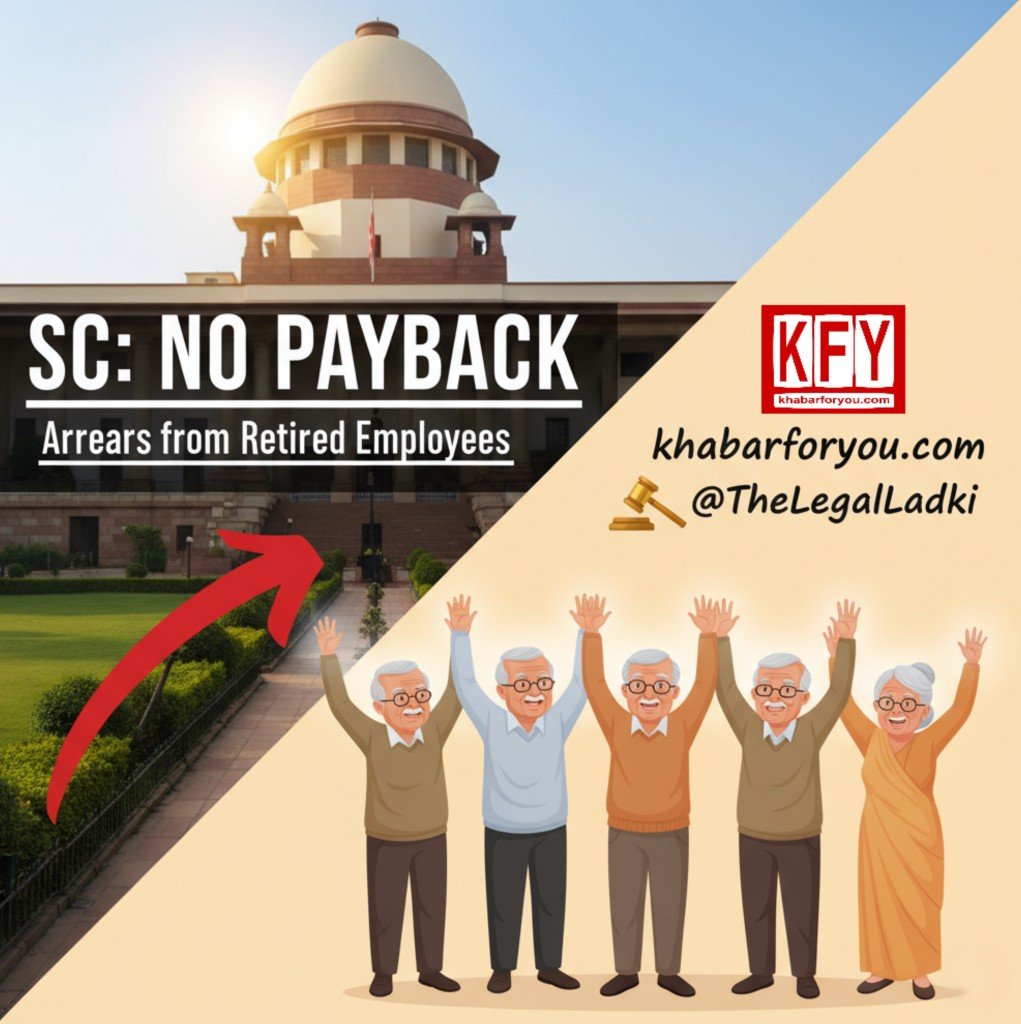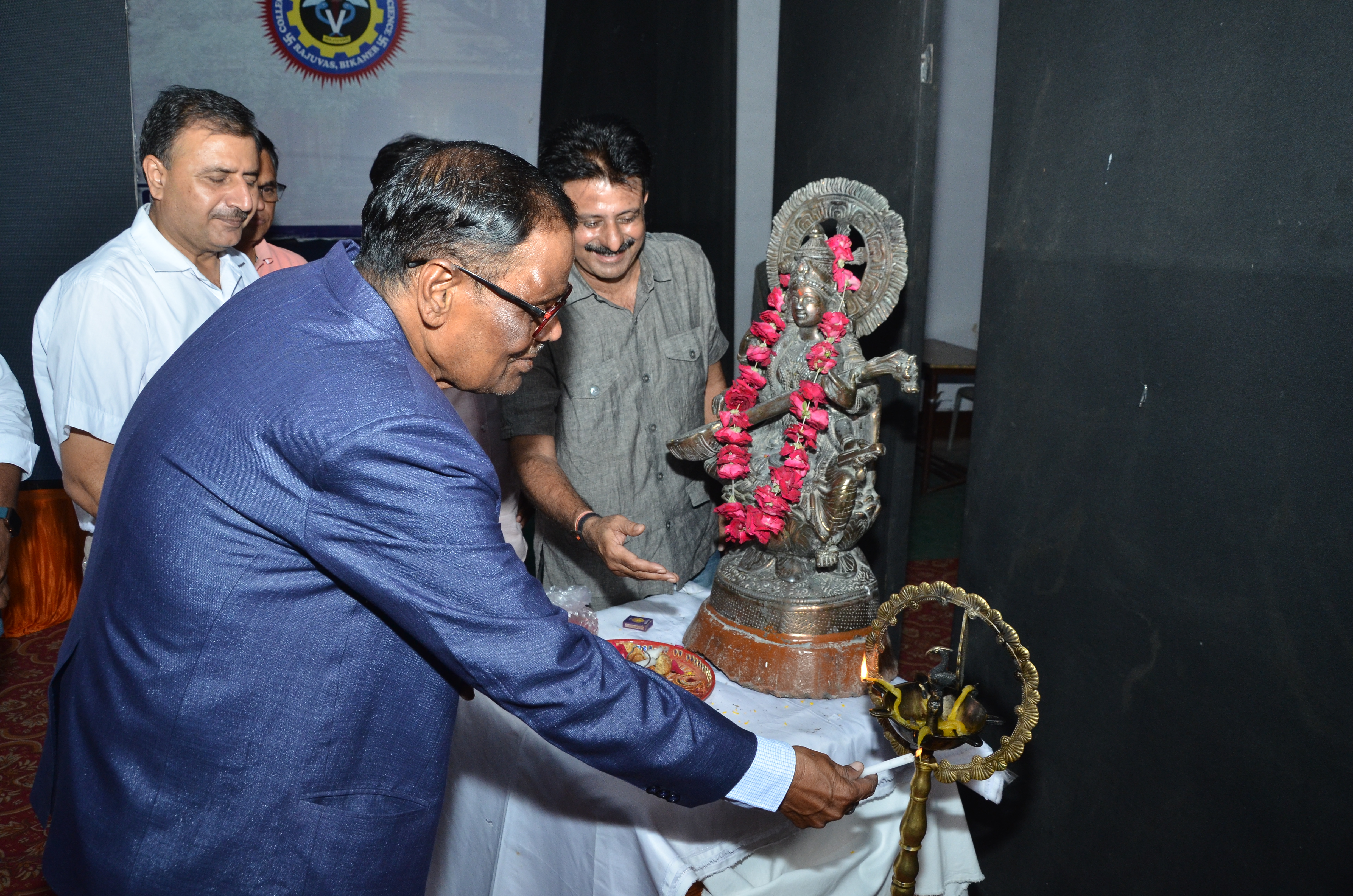SC: No Payback for Excess Arrears from Retired Employees (In English & Hindi) - KhabarForYou.com

- The Legal LADKI
- 05 Oct, 2025
- 98792

Email:-thelegalladki@gmail.com
Instagram:-@TheLegalLadki


Supreme Court Blocks Recovery of Excess Salary Arrears from Retired Employees
The Supreme Court of India recently delivered a significant judgment, granting relief to five retired employees of the Odisha judiciary department. The Court ruled that an excess payment of salary arrears, mistakenly paid to the employees six years prior, could not be recovered by the department. This ruling reaffirms a settled legal principle that such recovery is impermissible when the excess payment was not a result of fraud or misrepresentation on the part of the employee.
Background of the Case
The case centered on five individuals who had served in the Cuttack district judiciary department, Odisha, specifically in the Stenographer Grade-I and Personal Assistant cadres.
Erroneous Financial Benefit
· The Payment: In 2017, the employees received significant financial benefits in the form of salary arrears, with individual amounts ranging from approximately to over.
· The Cause: This payment stemmed from a retrospective promotion to Stenographer Grade-I, Grade-II, and Grade-III posts. The promotions and corresponding higher pay scales (arrears) were granted based on an interpretation of the Shetty Commission’s report.
· Retirement: The employees subsequently retired from their respective positions in 2020.
Recovery Order Issued
Three years after their retirement, and six years after the benefits were initially granted, the Odisha District Judiciary Department, Cuttack, moved to recover the amounts.
· The Rationale: The department asserted that the extension of the Shetty Commission's recommendations to these employees was based on an erroneous interpretation, thereby making the financial benefits subject to recovery.
· The Orders: Recovery orders were issued on September 8 and 12, 2023, directing the five retired employees to deposit the excess drawn salary arrears.
· Lack of Hearing: Crucially, these orders were issued without affording the retired employees any opportunity to be heard.
The employees initially filed a writ petition before the Odisha High Court, which was dismissed on November 9, 2023. They subsequently appealed to the Supreme Court.
Arguments Presented to the Supreme Court
The Supreme Court, comprised of Justice P.S. Narasimha and Justice Prashant Kumar Mishra, heard the arguments from both sides before delivering its judgment on April 4, 2025 (2025 INSC 449).
Argument for the Employees (Appellants)
The counsel for the retired employees argued that the excess amount was received without any fraud or misrepresentation on their part. Therefore, the recovery of the amount, especially after six years since payment and three years since their retirement, was held to be illegal and arbitrary. The employees’ lawyer also highlighted the failure of the High Court to consider the established legal position of the Supreme Court, which typically deems such recovery from a low-paid employee after retirement as bad in law.
Argument for the Judiciary Department (Respondent)
The department’s lawyer contended that the employees were not entitled to the financial benefit, and the recovery was justified because the District Judge's original order was later administratively reversed and affirmed by the High Court. A key point raised was that the financial benefit was granted with a specific condition that any excess amount paid shall be refunded, and the employees had furnished respective undertakings to that effect. The department argued that the employees were thus estopped from challenging the recovery.
Issue Under Consideration by the Supreme Court
The Supreme Court clarified that the issue before them was not the legality of the retrospective promotion or the financial benefit itself.
The core question for consideration was:
"Whether recovery of the amount extended to the appellants (retired employees) while they were in service is justified after their retirement, and that too without affording any opportunity of hearing."
Supreme Court's Analysis: The Principle of Equity
The Supreme Court’s analysis rested on the settled legal position concerning the recovery of excess payments made to government employees.
The Settled Law
The Court referred to a consistent line of its own judgments, including Sahib Ram vs. State of Haryana (1995), Shyam Babu Verma vs. Union of India (1994), and the recent Thomas Daniel vs. State of Kerala & Ors. (2022). Across these precedents, the Court has consistently held:
Recovery of excess payments of emoluments or allowances is not permissible if:
1. The excess amount was not paid due to any misrepresentation or fraud on the part of the employee.
2. The excess payment was made by the employer by applying a wrong principle for calculating the pay/allowance, or on the basis of an interpretation of a rule/order that is subsequently found to be erroneous.
Basis for Relief
The Supreme Court stressed that relief against recovery is granted not as a matter of right of the employee, but in equity. It is an exercise of judicial discretion to provide relief to the employee from the financial hardship that would be caused if the recovery is ordered.
Application to the Current Case
The Court applied these principles to the facts of the present case:
1. Absence of Fault: The record did not reflect that the excess payment was made due to any fraud or misrepresentation by the retired employees. The payment resulted from the District Judge’s interpretation of the Shetty Commission report, which was subsequently disapproved by the High Court.
2. Timing and Post: The payment was made in 2017, and recovery was ordered in 2023, with the appellants having already retired in 2020. Furthermore, the Court noted that the appellants had superannuated on a ministerial post of Stenographer and were not holding any gazetted post. Applying the principles laid down in prior judgments, recovery from a non-gazetted, low-paid, retired employee in such circumstances is deemed unsustainable.
3. Lack of Hearing: It was an undisputed fact that the employees were not afforded any opportunity of a hearing before the recovery order was issued.
The Supreme Court effectively prioritized the established judicial precedent, which protects non-gazetted, retired employees from the hardship of recovering an employer’s mistake, over the general undertaking signed by the employees.
Supreme Court Final Judgment
The Supreme Court concluded that the appeal was meritorious and deserved to be allowed based on the established legal position and the specific facts of the case.
The Final Order:
The Supreme Court allowed the appeal and set aside the impugned order of the High Court. In consequence, the recovery orders dated September 8 and 12, 2023, by which the appellants were directed to deposit the excess drawn arrears, were set aside.
The employees, who had erroneously been granted excess arrears and then asked to repay them six years later, were thus granted permanent relief.
____________________________________________________________________________________________________________________________________________________________
सर्वोच्च न्यायालय ने सेवानिवृत्त कर्मचारियों से अतिरिक्त वेतन बकाया की वसूली पर रोक लगाई |
भारत के सर्वोच्च न्यायालय ने हाल ही में एक महत्वपूर्ण फैसला सुनाते हुए ओडिशा न्यायपालिका विभाग के पाँच सेवानिवृत्त कर्मचारियों को राहत प्रदान की। न्यायालय ने कहा कि छह साल पहले कर्मचारियों को गलती से दिए गए वेतन बकाया के अतिरिक्त भुगतान की वसूली विभाग द्वारा नहीं की जा सकती। यह फैसला एक स्थापित कानूनी सिद्धांत की पुष्टि करता है कि ऐसी वसूली तब तक जायज़ नहीं है जब तक कि अतिरिक्त भुगतान कर्मचारी की ओर से धोखाधड़ी या गलतबयानी का परिणाम न हो।
मामले की पृष्ठभूमि -
यह मामला ओडिशा के कटक जिला न्यायपालिका विभाग में, विशेष रूप से स्टेनोग्राफर ग्रेड-I और निजी सहायक संवर्ग में कार्यरत पाँच व्यक्तियों पर केंद्रित था।
गलत वित्तीय लाभ -
• भुगतान: 2017 में, कर्मचारियों को वेतन बकाया के रूप में महत्वपूर्ण वित्तीय लाभ प्राप्त हुए, जिनकी अलग-अलग राशि लगभग ₹1,000 से ₹1,000 से ₹2,000 तक थी।
• कारण: यह भुगतान स्टेनोग्राफर ग्रेड-I, ग्रेड-II और ग्रेड-III के पदों पर पूर्वव्यापी पदोन्नति से उत्पन्न हुआ था। शेट्टी आयोग की रिपोर्ट की व्याख्या के आधार पर पदोन्नति और संबंधित उच्च वेतनमान (बकाया) प्रदान किए गए थे।
• सेवानिवृत्ति: कर्मचारी 2020 में अपने-अपने पदों से सेवानिवृत्त हो गए।
वसूली आदेश जारी -
सेवानिवृत्ति के तीन साल बाद, और लाभ शुरू में दिए जाने के छह साल बाद, ओडिशा जिला न्यायपालिका विभाग, कटक ने राशि वसूलने के लिए आवेदन किया।
• तर्क: विभाग ने दावा किया कि इन कर्मचारियों को शेट्टी आयोग की सिफारिशों का विस्तार एक गलत व्याख्या पर आधारित था, जिससे वित्तीय लाभ वसूली के अधीन हो गए।
• आदेश: 8 और 12 सितंबर, 2023 को वसूली आदेश जारी किए गए, जिसमें पाँच सेवानिवृत्त कर्मचारियों को अतिरिक्त आहरित वेतन बकाया जमा करने का निर्देश दिया गया।
• सुनवाई का अभाव: महत्वपूर्ण बात यह है कि ये आदेश सेवानिवृत्त कर्मचारियों को सुनवाई का कोई अवसर दिए बिना जारी किए गए।
कर्मचारियों ने शुरू में ओडिशा उच्च न्यायालय में एक रिट याचिका दायर की, जिसे 9 नवंबर, 2023 को खारिज कर दिया गया। इसके बाद उन्होंने सर्वोच्च न्यायालय में अपील की।
सर्वोच्च न्यायालय में प्रस्तुत तर्क -
न्यायमूर्ति पी.एस. नरसिम्हा और न्यायमूर्ति प्रशांत कुमार मिश्रा की सदस्यता वाले सर्वोच्च न्यायालय ने 4 अप्रैल, 2025 (2025 आईएनएससी 449) को अपना फैसला सुनाने से पहले दोनों पक्षों की दलीलें सुनीं।
कर्मचारियों (अपीलकर्ताओं) की ओर से तर्क -
सेवानिवृत्त कर्मचारियों के वकील ने तर्क दिया कि अतिरिक्त राशि उनकी ओर से बिना किसी धोखाधड़ी या गलतबयानी के प्राप्त की गई थी। इसलिए, राशि की वसूली, विशेष रूप से भुगतान के छह साल और सेवानिवृत्ति के तीन साल बाद, अवैध और मनमानी मानी गई। कर्मचारियों के वकील ने उच्च न्यायालय द्वारा सर्वोच्च न्यायालय की स्थापित कानूनी स्थिति पर विचार करने में विफलता पर भी प्रकाश डाला, जो आमतौर पर सेवानिवृत्ति के बाद कम वेतन वाले कर्मचारी से ऐसी वसूली को कानून की दृष्टि से गलत मानता है।
न्यायिक विभाग (प्रतिवादी) की ओर से तर्क-
विभाग के वकील ने तर्क दिया कि कर्मचारी वित्तीय लाभ के हकदार नहीं थे, और यह वसूली उचित थी क्योंकि जिला न्यायाधीश के मूल आदेश को बाद में प्रशासनिक रूप से पलट दिया गया था और उच्च न्यायालय ने इसकी पुष्टि की थी। एक प्रमुख मुद्दा यह उठाया गया कि वित्तीय लाभ इस विशिष्ट शर्त के साथ दिया गया था कि भुगतान की गई कोई भी अतिरिक्त राशि वापस की जाएगी, और कर्मचारियों ने इस आशय का अपना-अपना वचन दिया था। विभाग ने तर्क दिया कि इस प्रकार कर्मचारियों को वसूली को चुनौती देने से रोक दिया गया था।
सर्वोच्च न्यायालय द्वारा विचाराधीन मुद्दा -
सर्वोच्च न्यायालय ने स्पष्ट किया कि उनके समक्ष मुद्दा पूर्वव्यापी पदोन्नति या वित्तीय लाभ की वैधता का नहीं था।
विचारणीय मुख्य प्रश्न यह था:
"क्या अपीलकर्ताओं (सेवानिवृत्त कर्मचारियों) को सेवाकाल के दौरान दी गई राशि की वसूली उनकी सेवानिवृत्ति के बाद, और वह भी बिना सुनवाई का अवसर दिए, उचित है?"
सर्वोच्च न्यायालय का विश्लेषण: समता का सिद्धांत -
सर्वोच्च न्यायालय का विश्लेषण सरकारी कर्मचारियों को किए गए अतिरिक्त भुगतान की वसूली से संबंधित स्थापित कानूनी स्थिति पर आधारित था।
स्थापित कानून -
न्यायालय ने साहिब राम बनाम हरियाणा राज्य (1995), श्याम बाबू वर्मा बनाम भारत संघ (1994), और हाल ही में आए थॉमस डैनियल बनाम केरल राज्य एवं अन्य (2022) सहित अपने स्वयं के निर्णयों की एक सुसंगत पंक्ति का उल्लेख किया। इन सभी उदाहरणों में, न्यायालय ने लगातार यह माना है:
यदि परिलब्धियों या भत्तों के अतिरिक्त भुगतान की वसूली स्वीकार्य नहीं है:
1. कर्मचारी की ओर से किसी गलत बयानी या धोखाधड़ी के कारण अतिरिक्त राशि का भुगतान नहीं किया गया था।
2. नियोक्ता द्वारा वेतन/भत्ते की गणना के लिए गलत सिद्धांत लागू करके, या किसी नियम/आदेश की व्याख्या के आधार पर अतिरिक्त भुगतान किया गया था, जिसे बाद में गलत पाया गया।
राहत का आधार -
सर्वोच्च न्यायालय ने इस बात पर ज़ोर दिया कि वसूली के विरुद्ध राहत कर्मचारी के अधिकार के रूप में नहीं, बल्कि समता के आधार पर दी जाती है।
वसूली का आदेश दिए जाने पर कर्मचारी को होने वाली वित्तीय कठिनाई से राहत प्रदान करना न्यायिक विवेकाधिकार का प्रयोग है।
वर्तमान मामले में अनुप्रयोग -
न्यायालय ने वर्तमान मामले के तथ्यों पर इन सिद्धांतों को लागू किया:
1. दोष का अभाव: अभिलेखों से यह नहीं पता चलता कि अतिरिक्त भुगतान सेवानिवृत्त कर्मचारियों द्वारा किसी धोखाधड़ी या गलतबयानी के कारण किया गया था। भुगतान जिला न्यायाधीश द्वारा शेट्टी आयोग की रिपोर्ट की व्याख्या के परिणामस्वरूप हुआ था, जिसे बाद में उच्च न्यायालय ने अस्वीकृत कर दिया था।
2. समय और पद: भुगतान 2017 में किया गया था, और वसूली का आदेश 2023 में दिया गया था, जबकि अपीलकर्ता 2020 में ही सेवानिवृत्त हो चुके थे। इसके अलावा, न्यायालय ने यह भी कहा कि अपीलकर्ता स्टेनोग्राफर के एक मंत्री पद से सेवानिवृत्त हुए थे और किसी राजपत्रित पद पर नहीं थे। पूर्व निर्णयों में निर्धारित सिद्धांतों को लागू करते हुए, ऐसी परिस्थितियों में एक अराजपत्रित, कम वेतन वाले, सेवानिवृत्त कर्मचारी से वसूली असंतुलित मानी जाती है।
3. सुनवाई का अभाव: यह एक निर्विवाद तथ्य था कि वसूली आदेश जारी होने से पहले कर्मचारियों को सुनवाई का कोई अवसर नहीं दिया गया।
सर्वोच्च न्यायालय ने प्रभावी रूप से स्थापित न्यायिक मिसाल को प्राथमिकता दी, जो अराजपत्रित, सेवानिवृत्त कर्मचारियों को नियोक्ता की गलती की भरपाई की कठिनाई से बचाती है, कर्मचारियों द्वारा हस्ताक्षरित सामान्य वचनबद्धता पर।
सर्वोच्च न्यायालय का अंतिम निर्णय -
सर्वोच्च न्यायालय ने निष्कर्ष निकाला कि अपील योग्य थी और स्थापित कानूनी स्थिति और मामले के विशिष्ट तथ्यों के आधार पर स्वीकार की जानी चाहिए।
अंतिम आदेश:
सर्वोच्च न्यायालय ने अपील स्वीकार कर ली और उच्च न्यायालय के विवादित आदेश को रद्द कर दिया। परिणामस्वरूप, 8 और 12 सितंबर, 2023 के वसूली आदेश, जिनके द्वारा अपीलकर्ताओं को अतिरिक्त आहरित बकाया राशि जमा करने का निर्देश दिया गया था, रद्द कर दिए गए।
जिन कर्मचारियों को गलती से अतिरिक्त बकाया राशि प्रदान की गई थी और फिर उन्हें छह साल बाद चुकाने के लिए कहा गया था, उन्हें इस प्रकार स्थायी राहत प्रदान की गई।
Business, Sports, Lifestyle ,Politics ,Entertainment ,Technology ,National ,World ,Travel ,Editorial and Article में सबसे बड़ी समाचार कहानियों के शीर्ष पर बने रहने के लिए, हमारे subscriber-to-our-newsletter khabarforyou.com पर बॉटम लाइन पर साइन अप करें। |
| यदि आपके या आपके किसी जानने वाले के पास प्रकाशित करने के लिए कोई समाचार है, तो इस हेल्पलाइन पर कॉल करें या व्हाट्सअप करें: 8502024040 |
#KFY #KFYNEWS #KHABARFORYOU #WORLDNEWS
नवीनतम PODCAST सुनें, केवल The FM Yours पर
Click for more trending Khabar


Leave a Reply
Your email address will not be published. Required fields are marked *
Search
Category







